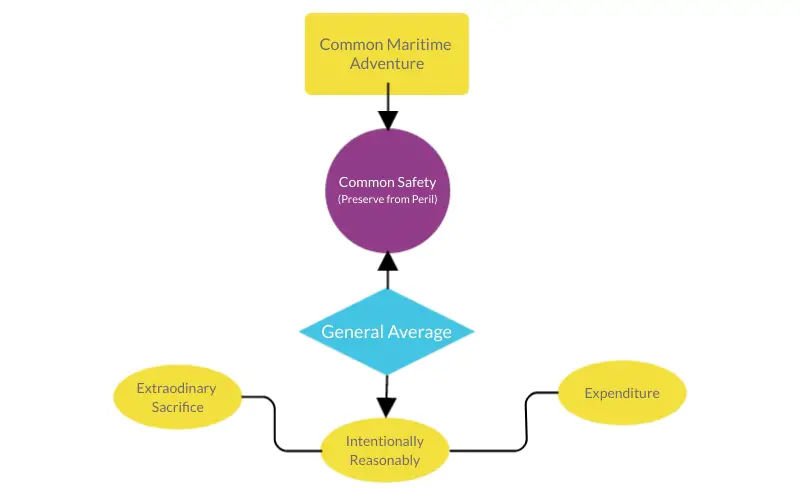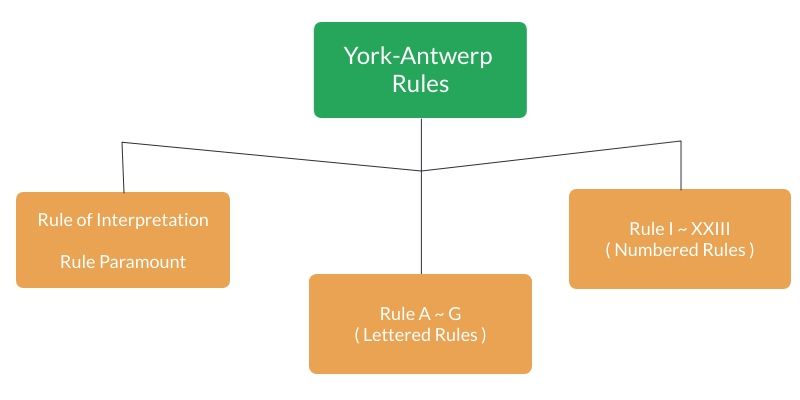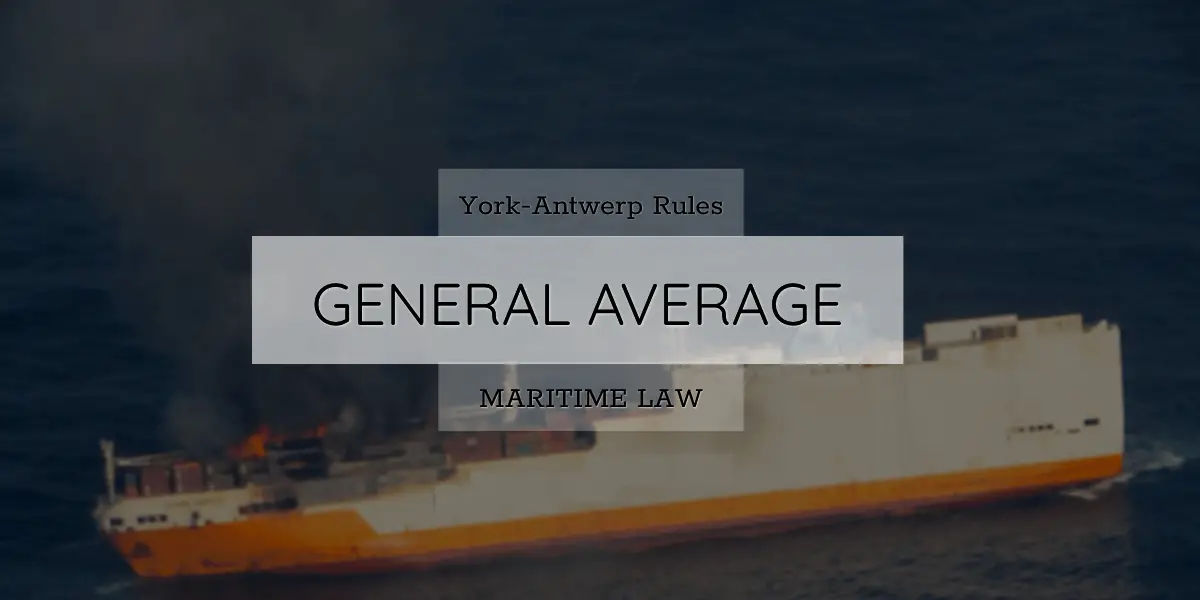Contents
General Average
There is a General Average act when and only when any extraordinary or expenditure is intentionally and reasonably made or incurred for the common safety, for the purpose of preserving from peril, the property involved in a common maritime adventure.

Extraordinary Sacrifice in a General Average
Below are examples for an extraordinary sacrifice, though not limited to:
- Damage done to the engine to refloat the vessel after grounding.
- Jettisoning of cargo under Deck.
- Jettisoning of Cargo on Deck as per Custom of the trade.
- Slipping of Anchor and Cable to avoid Collision.

Extraordinary Expenditure in a General Average
Below are examples for an extraordinary expenditure, though not limited to:
- Cost of Hiring a Tug to refloat a Ship with cargo onboard.
- Cost of discharging Cargo in order to refloat a ship.
- Port of Refuge Costs.
- Salvage Costs

Calculations for General Average
General Average Loss: is any expense/sacrifice which is allowed as general average and can be recovered.
Contributory Value: is the value of the property on arrival at the place of safety + G.A loss made up for that property.
Consider a vessel whose worth is 1 million (1,000,000 $) and carrying cargoes A, B and C.
| Cargo A worth: | 50,000 $ |
| Cargo B worth: | 120,000 $ |
| Cargo C worth: | 200,000 $ |
Vessel catches fire in the hold where now Cargo B is affected by the fire.
Water is used for the fire fighting which partially damages Cargo C as it gets wet.
Free surface effect affects the stability and the Master decides to beach the ship.
The vessel was subsequently refloated and the cost incurred and damages as follows:
| Lost Value of Cargo B | 30,000 $ |
| Arrived Value of Cargo C | 180,000 $ |
| Ship arrived Value | 950,000 $ |
| Cost of Repairs | 50,000 $ |
| Cost of Refloating | 150,000 $ |
| Port of Refuge Charges | 50,000 $ |
Thus the General Average (G.A.) Losses are as follows:
| For Ship | 50,000 $ |
| For Cargo C | 20,000 $ |
| For Refloating & Port of Refuge COst | 150,000 $ + 50,000 $ |
| TOTAL G.A. Loss | 270,000 $ |
Please note the damage caused to Cargo B was purely due to the Fire which was an accident, hence the Lost Value of the cargo and will not be considered as General Average Loss.
Contributory Value
| Ship | 950,000 + 50,000 | 1,000,000 $ |
| Cargo A | 50,000 + 0 | 50,000 $ |
| Cargo B | 90,000 + 0 | 90,000 $ |
| Cargo C | 180,000 + 20,000 | 200,000 $ |
| TOTAL: | 1,340,000 $ |
G.A. Loss to make good = 270,000 $
| Contribution of Ship | |
| Contribution of Owner of Cargo A | |
| Contribution of Owner of Cargo B | |
| Contribution of Owner of Cargo C |
Thus, the total of the contribution will work out to be 270,000 $ which is the General Average loss to be made good.
Particular Average: It is a partial loss caused by a peril insured against e.g. damage to cargo, damage to ship due to weather etc.
Particular Charges: Expenses incurred by or on behalf of the insured for the safety or preservation of the property insured. It excludes general average and salvage charges.
York Antwerp Rules ( 2004 )
YARs are a set of rules set out by Ship Owners, Merchants, Underwriters and Adjusters for the benefit of the settlement of General Average.
It has to be mentioned in the Charter Party or Bill of Lading that G.A. will be as per York Antwerp Rules.

Evolution of York Antwerp Rules
There are 7 Lettered Rules ( A ~ G ) which are general rules and 23 Numbered Rules ( I ~ XXIII ) which are specific to a particular average act/sacrifice/damage and used for determining the calculation of the General Average.

Rule of Interpretation
In the adjustment of general average, the YARs shall apply to the exclusion of any law and practice inconsistent therewith.
Except as provided by the Rule Paramount and the Numbered Rules, general average shall be adjusted according to the Lettered Rules.
Rule Paramount
In no case shall there be any allowance for sacrifice or expenditure unless reasonably made or incurred. For example War, Strikes, Civil War, Labour Disturbances holds no cover.
Lettered Rules (A ~ G)
Rule A
- There is a general average act when, and only when, any extraordinary sacrifice or expenditure is intentionally and reasonably made or incurred for the common safety for the purpose of preserving from peril the property involved in a common maritime adventure.
- General average sacrifices and expenditures shall be borne by the different contributing interests on the basis hereinafter provided.
Rule B
- There is a common maritime adventure when one or more vessels are towing or pushing another vessel or vessels, provided that they are all involved in commercial activities and not in a salvage operation.
When measures are taken to preserve the vessels and their cargoes, if any, from a common peril, these Rules shall apply. - If the vessels are in common peril and one is disconnected either to increase the disconnecting vessel’s safety alone or the safety of all vessels in the common maritime adventure, the disconnection will be a general average act.
- Where vessels involved in a common maritime adventure resort to a port or place of refuge, allowances under these Rules may be made in relation to each of the vessels. Subject to the provisions of paragraphs 3 and 4 of Rule G, allowances in general average shall cease at the time that the common maritime adventure comes to an end.
Rule C
- Only such losses, damages or expenses which are the direct consequence of the general average act shall be allowed as general average.
- In no case shall there be any allowance in general average for losses, damages or expenses incurred in respect of damage to the environment or in consequence of the escape or release of pollutant substances from the property involved in the common maritime adventure.
- Demurrage, loss of market, and any loss or damage sustained or expense incurred by reason of delay, whether on the voyage or subsequently, and any indirect loss whatsoever, shall not be allowed as general average.
Rule D
Rights to contribution in general average shall not be affected, though the event which gave rise to the sacrifice or expenditure may have been due to the fault of one of the parties to the common maritime adventure, but this shall not prejudice any remedies or defences which may be open against or to that party in respect of such fault.
Rule E
- The onus of proof is upon the party claiming in general average to show that the loss or expense claimed is properly allowable as general average.
- All parties to the common maritime adventure shall, as soon as possible, supply particulars of value in respect of their contributory interest and, if claiming in general average, shall give notice in writing to the average adjuster of the loss or expense in respect of which they claim contribution, and supply evidence in support thereof.
- Failing notification, or if any party does not supply particulars in support of a notified claim, within 12 months of the termination of the common maritime adventure or payment of the expense, the average adjuster shall be at liberty to estimate the extent of the allowance on the basis of the information available to the adjuster. Particulars of value shall be provided within 12 months of the termination of the common maritime adventure, failing which the average adjuster shall be at liberty to estimate the contributory value on the same basis. Such estimates shall be communicated to the party in question in writing. Estimates may only be challenged within two months of receipt of the communication and only on the grounds that they are manifestly incorrect.
- Any party to the common maritime adventure pursuing recovery from a third party in respect of sacrifice or expenditure claimed in general average, shall so advise the average adjuster and, in the event that a recovery is achieved, shall supply to the average adjuster full particulars of the recovery within two months of receipt of the recovery.
Rule F
Any additional expense incurred in place of another expense which would have been allowable as general average shall be deemed to be general average and so allowed without regard to the saving, if any, to other interests, but only up to the amount of the general average expense avoided.
Rule G
- General average shall be adjusted as regards both loss and contribution upon the basis of values at the time and place when and where the common maritime adventure ends.
- This rule shall not affect the determination of the place at which the average adjustment is to be prepared.
- When a ship is at any port or place in circumstances which would give rise to an allowance in general average under the provisions of Rules X and XI, and the cargo or part thereof is forwarded to destination by other means, rights and liabilities in general average shall, subject to cargo interests being notified if practicable, remain as nearly as possible the same as they would have been in the absence of such forwarding, as if the common maritime adventure had continued in the original ship for so long as justifiable under the contract of carriage and the applicable law.
- The proportion attaching to the cargo of the allowances made in general average by reason of applying the third paragraph of this Rule shall be limited to the cost which would have been borne by the owners of cargo if the cargo had been forwarded at their expense. This limit shall not apply to any allowances made under Rule F.
Numbered Rules (I ~ XXIII)
Differences Between 1994 / 2004 / 2016 YARs
Credits for the below: Richards Hogg Lindley

Leave a Reply